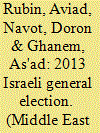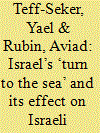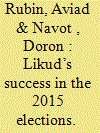|
|
|
Sort Order |
|
|
|
Items / Page
|
|
|
|
|
|
|
| Srl | Item |
| 1 |
ID:
129894


|
|
|
|
|
| Publication |
2014.
|
| Summary/Abstract |
Despite resulting in a different party configuration, the results of the 2013 Israeli general election support a similar agenda to the one set by the previous government. A year following its establishment, all indicators suggest that the current government continues to deepen neoliberal policies. Nevertheless, this election reflects two important trends: first, an ever growing discontent in Israeli public that probably would not find a solution during the tenure of the incoming government; second, lack of interest in the Israeli-Palestinian conflict that might generate negative long-term consequences.
|
|
|
|
|
|
|
|
|
|
|
|
|
|
|
|
| 2 |
ID:
154323


|
|
|
|
|
| Summary/Abstract |
The results of the 2015 Israeli election, primarily the sweeping victory of Binyamin Netanyahu’s Likud party, surprised most analysts. In this article we employ political scientist Michael Oakeshott’s distinction in arguing that the campaign dynamics and the consequent electoral results reflect the triumph of a “politics of skepticism” among Jews, and the emergence of a “politics of faith” among Israel’s Arab-Palestinian citizens. Both derive from a combination of external and domestic circumstances and their effective exploitation by charismatic political leaders.
|
|
|
|
|
|
|
|
|
|
|
|
|
|
|
|
| 3 |
ID:
163606


|
|
|
|
|
| Summary/Abstract |
Since the mid-1990s, both the Israeli state and Israeli society have been developing and implementing several separate new policies regarding the country’s seas. These include the extraction of offshore hydrocarbons; expansion of the navy; massive desalination projects; and several legislative, planning, and zoning initiatives. Put together, these changes amount to a “turn to the sea” that profoundly affects Israel’s economy, foreign policy, and military. This article compares this shift to historical precedents, offering Israel as a template for a new, cumulative model that does not conform to the existing narratives of how polities have turned to the maritime domain.
|
|
|
|
|
|
|
|
|
|
|
|
|
|
|
|
| 4 |
ID:
165288


|
|
|
|
|
| Summary/Abstract |
The article analyses the effect of Israel’s new maritime orientation on its foreign policy. It first demonstrates that in the last two decades Israel has changed its maritime posture in three important ways: it has developed energy dependence on offshore gas, begun extensive seawater desalination and dramatically expanded its navy’s platforms and missions. The paper then investigates the effects of these changes on Israel’s bilateral relations with its neighbours. Finally, the paper highlights the cumulative effect of these changes as well as some of their implications for Israel’s foreign policy.
|
|
|
|
|
|
|
|
|
|
|
|
|
|
|
|
| 5 |
ID:
149186


|
|
|
|
|
| Summary/Abstract |
The current article develops an explanation for Likud’s success, which goes beyond the existing structural and circumstantial accounts. It argues that Likud’s success should be sought for in the utilization of Hobbesian logic by its leader, Benjamin Netanyahu. By revealing the commonalities between Hobbes’s political thinking and Rhetoric, and Netanyahu’s political conduct, this paper sheds new light on Netanyahu’s leadership and sources of legitimation and authority in Israel, which are understudied. We demonstrate that Netanyahu’s Hobbesian dimension is best reflected in his understanding of the nature of civil and political rights in the context of an ongoing struggle for survival and self-determination.
|
|
|
|
|
|
|
|
|
|
|
|
|
|
|
|
| 6 |
ID:
177022


|
|
|
|
|
| Summary/Abstract |
This study argues that the effect of third-party trade on dyadic conflicts is conditional on the naval power of both the potential conflict initiator and its target state. This conditional effect occurs mainly because naval power allows trade-integrated initiators to reduce their trade dependence on a given trade partner and its allies more easily. At the same time, the target’s naval power increases the costs that conflict inflict on the initiator’s trade. As maritime trade accounts for about 80 percent of world trade volume, naval capability has an important effect on combatant states’ ability to substitute trading partners during a conflict and to mitigate trade-related costs, thereby affecting the relationship between third-party trade and conflict. The findings of our statistical analyses support our theoretical expectation that the pacifying effect of third-party trade diminishes as the initiator’s naval power increases, yet increases as the naval power of the potential target increases.
|
|
|
|
|
|
|
|
|
|
|
|
|
|
|
|
| 7 |
ID:
168417


|
|
|
|
|
| Summary/Abstract |
Recent developments in the eastern Mediterranean, such as significant gas finds; disagreements over the demarcation of maritime boundaries; large-scale violence and political instability following the Arab Spring; mass migration via sea routes; Great Power dynamics in the region; and environmental hazards, make the political entities along the shores of the eastern Mediterranean part of a regional security complex and create strong incentives for regional coordination on maritime security. Material international relations theories predict that growing security challenges (realism) coupled with expected gains (liberalism) will facilitate regional cooperation. Yet, the political entities in the region rely mainly on unilateral actions, or limited quasi-alliances in response to these challenges. The article shows the puzzling gap between the theoretical expectation and practical outcome in the region and explains why regional cooperation in the maritime domain fails to occur. It argues that cooperation on a regional scale fails to take place due to three complementing reasons: 1) lack of shared ideational features like cultural traits, set of values and regime type; 2) enduring rivalries between political entities in the region (Israel–Palestine; Turkey–Greece–Cyprus) coupled with internal strife within other regional political entities (Libya; Syria); and unequal political standing and lack of sovereignty of some of the political entities in the region (Northern Cyprus; the Palestinian Authority and the Gaza Strip).
|
|
|
|
|
|
|
|
|
|
|
|
|
|
|
|
| 8 |
ID:
121871


|
|
|
|
|
| Publication |
2013.
|
| Summary/Abstract |
Why do some newly formed regimes incorporate religion in various dimensions of public affairs, while others relegate religious actors and content to the private sphere? This article offers an explanatory model with four key components that together determine the status of religion in newborn political regimes: (1) the pervasiveness of religion in the old order; (2) the overlap among different ingredients of national-identity; (3) the constraints of demographic realities; and (4) the period before and during the formation of the new regime as critical juncture. The model is applied and tested in the cases of Israel and Turkey, which in many respects represent opposite trends - accommodation and marginalization, respectively - that produced broad and long-term consequences for their respective political regimes.
|
|
|
|
|
|
|
|
|
|
|
|
|
|
|
|
|
|
|
|
|